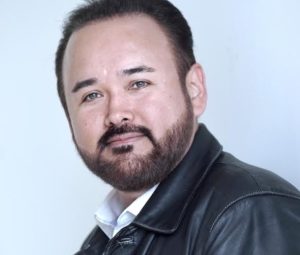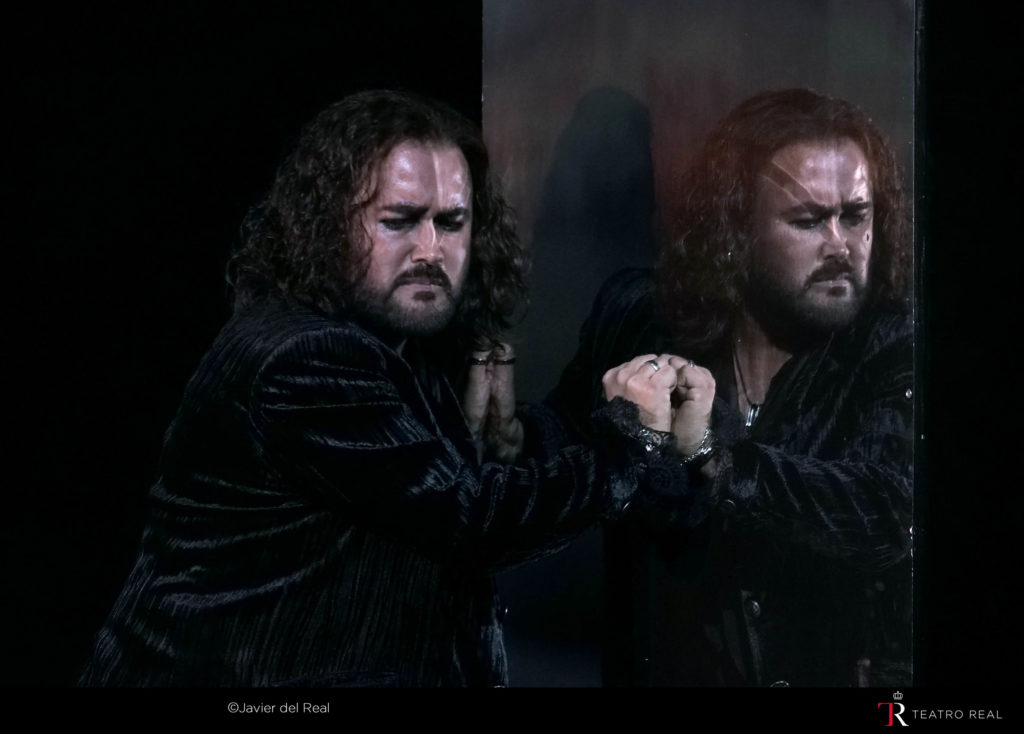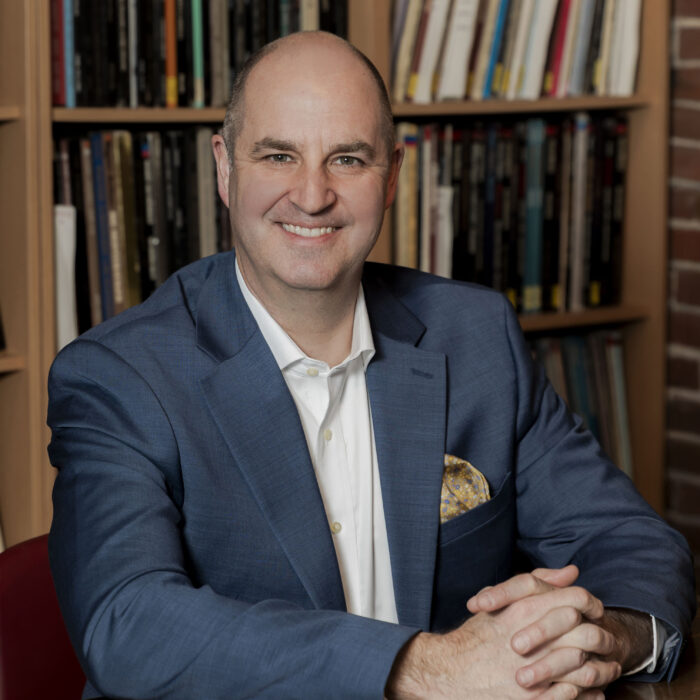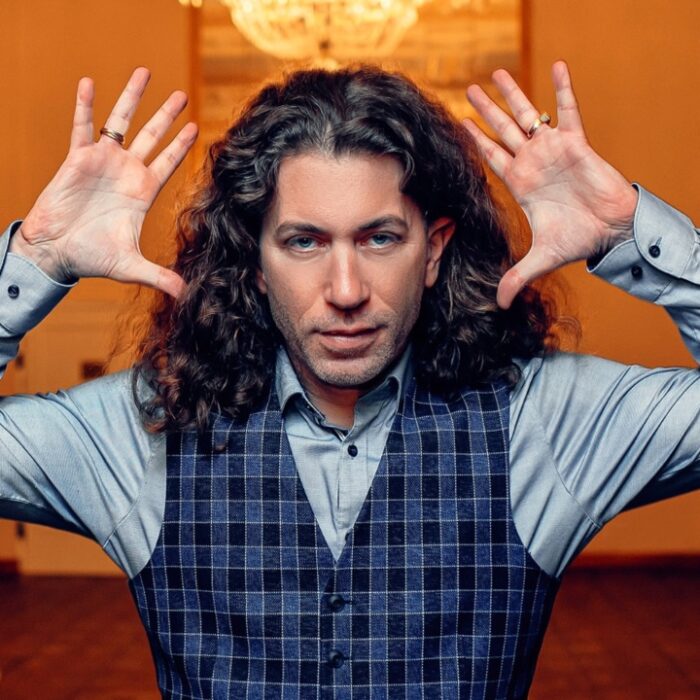
Q & A: Tenor Javier Camarena on Why ‘Il Pirata’ Has Been the Most Challenging Role of His Career
By Mauricio Villa(Credit: Javier del Real)
Mexican tenor Javier Camarena really needs no introduction. As one of the foremost tenors in the world, he has become a fixture at all the major opera houses. However, he has forged a particularly unique one with the Teatro Real de Madrid where audiences have witnessed some of his biggest triumphs. He performed the now legendary “Lucia di Lammermoor” with Lisette Oropesa last year in the Spanish capital and this season triumphed with a solo recital and in a single performance of “L’Elisir d’Amore” where his encore of “Una furtiva lagrima” brought down the house.
He debuted there with “La fille du regiment” in 2014 and and has since made several role debuts with the company in such operas as “La Favorite” and “Lucia di Lamermoor.” His latest production in Madrid is Bellini’s “Il Pirata,” another role debut for the tenor with the company.
OperaWire recently had an opportunity to speak to Camarena about his newest role and his relationship with the Teatro Real de Madrid.
Opera Wire: Why did you decide to sing such a difficult and unknown role like Gualtiero in “Il Pirata?”
Javier Camarena: Well this is part of my idea of transition from a lyrical leggero to a Lyrical repertoire that I am currently going through and started five years ago when I started singing Bizet’s “Les Pècheurs de perles” and then continue with “Maria Stuarda,” “Rigoletto,” and “I Puritani;” therefore “Il Pirata” felt like an obvious next step. The funny thing is that I though that if I could sing “I Puritani,” I could sing everything. Now that I have managed to sing “Il Pirata,” I think that “maybe” I can sing some other pieces.
OW: Is this the hardest role that you have sung?
JC: Yes, it is indeed the hardest role that I have ever done; there is this anecdote which happens during rehearsals of the premiere of the opera where Bellini complained to Rubbini ( the tenor for which the role of Gualtiero was written): “You are not doing what I am telling you to do. You are not giving yourself to the role. If you would do this, it could be amazing.” That means that even for Rubbini, who had an unique and extraordinary voice, this level of romanticism in the work proved quite a challenge.
OW: With the exception of the stratospheric high notes and general tessitura of this role, how do you manage the nearly baritonal tessitura of Gualtiero’s first duet with Imogene in Act one or some of the recitatifs?
JC: I try not to think too much about it because if I do so, my voice goes to a very low position and climbing up for the high notes would be much more difficult. This makes much more sense if we consider how the opera was performed when it was written and how Rubbini would switch from chest voice in the lower and middle register to falsetto for the high notes.
Another case would be Manuel Garcia, another tenor from that period, whose biography I have been working on for a long time. He was considered a bari-tenor, who was quite present in Rossini’s Naples compositions. He had a very strong low and middle register with incredible top register in falsetto. If you listened to “Il Poeta calculista” where in the score is written as a duet, this piece is really a monologue playing with both registers: the full chest low baritonal register and the falsetto stratospheric high part of the voice. And we have to take in mind that baritones would sometimes turn into countertenors when switching to a falsetto voice production. So, considering that Rubbini likely had a similar technique, then this writing of the role makes more sense.
To summarize, I try to give all the dramatism by playing with the color of the voice and the consistency that I have been gaining in the middle and lower part of my voice when singing more lyrical parts. But I always keep my voice in a very high position to be able to climb up for the high notes required. I find it really hard and complicated, but this is part of my job.
OW: Can you compare differences or difficulties between “Il Pirata” and “I Puritani,” both written for the tenor Rubbini?
JC: It is pretty clear that the main similarity would be the long beautiful melodies which characterize Bellini’s compositions. In “Il Pirata” you have Gualtiero’s second act aria “Tu vedrai la sventurata,” which is full of this extremely long legato phrases. To me it is one of the most beautiful parts of the role and the most comfortable part for me. We also have this lovely melody in the second part of Gualtiero-Imogene’s duet, “Per noi tranquilo un porto,” but it is so difficult for me to sing this section.
The main difference would be that in “I Puritani” we see a very defined Bellini style while in “Il Pirata” you hear still a lot of Rossinian influence. There are lots of examples in Gualtiero’s writing with coloratura passages like “Bagnato dalle lacrime” or at the coda of Gualtiero’s second cabaletta “Ma non fia sempre odiata.” You don’t find that in “Puritani.”
Arturo from “I Puritani” has always been classified as a lyrical-leggero role because of all the high D and the infamous high F. We also have this confrontation between Arturo and Riccardo in Act one, which requires lot of bravura and dramatism too. But in general Puritani’s structure makes much more sense and after this scene with Riccardo you have a whole act to rest and recover before the third act. I consider that Bellini was more conscious about vocal writing in “Puritani” even if you have those dramatic moments like “Credeasi misera.” It is very comfortable to sing the rest of the score while in “Pirata” you see a young Bellini experimenting with the vocal writing and you always feel like being at the edge of a cliff.
OW: What about “La Sonnambula,” which is another Rubbini role that you have sung?
JC: I haven’t sung this role for a while, I think 2013 was my last performances of Elvino, although I have scheduled performances of “Sonnambula” in Deustche Oper in Berlin next year. Even if Elvino can be considered a more leggero role, you have all his ensembles and his cabaletta “Ah, perche non posso odiarti” where a light timbre would not match the dramatism required. Bellini, from the very beginning, was researching a new way of operatic writing that differed from Rossini or Mercadante. He was looking for a romantic dramatism in his opera which is quite far from the florid vocal style which reigned when he begun composing.
OW: You have been named “The tenor of the impossible operas.” What do you think about this?
JC: I have always hated that title (he laughs). I mean if they were impossible, nobody would sing them and there are lots of tenors today who can bring the purity and the brightness of the bel canto repertoire. And it is amazing that we have so many tenors with great quality in the singing. It is not only about how loud one can sing or how high. We actually have examples of much more accurate bel canto repertoire nowadays than 30 years ago.

(Credit: Javier del Real)
Opera Wire: In fact Bellini’s “Il Pirata” score has been massacred the tenor part for years. Not only was the opera severely cut without the high notes, but even the keys of some sections were lowered.
JC: I understand why. This section is impossible to sing well. Take for example “Una furtiva lagrima” from Donizetti which is a hard aria to sing. It is hard to transmit the right atmosphere while always navigating the passagio zone. Imagine singing this aria one tone higher. You feel strangled by singing over the passagio all the time and this is what we have to face in this duet with Imogene. It is so difficult.
OW: What do you think about Gualtiero’s character from a dramatic point of view? Has Emilio Sagi helped you discover new aspects of the character?
JC: Emilio is such a great stage director because he is always taking care of the singers. I have already done three productions with him: “Barbiere” in San Francisco, and “Puritani” and “Pirata” here in Madrid. He always looks for you and gives you the freedom to do what you have to do, which is sing well. Besides this, he has a clear sketch of what he expects to be happening on stage, about the personification of the character, and about the dramatism, but he gives you freedom to do whatever fits you best both vocally and dramatically.
My Gualtiero is very different from the work of Albelo or Korchak, who are my colleagues in this production. Gualtiero is a very selfish and mentally unstable character. He is always looking out for himself, for his revenge, and mistreating the woman he loves, threatening her with killing her child. Even in his last aria “Tu vedrai,” which has a wonderful sorrowful melody, he is thinking about his own death and how to clear his name. He never considers how Imogene feels. Even if some melodies are beautiful, he is always saying something cruel. It is very hard to portray a tenor role who is the “antihero,” as in this opera.
OW: You have debuted three roles at Teatro Real in such operas as “La Favorite”, “Lucia di Lammermoor” and “Il Pirata.” Is this by chance or you have chosen this opera house specifically?
JC: I will always be grateful to Joan Matabosch, the director of the Teatro Real. As I have conducted my career, I have propose new ideas for my repertoire to my agent and the operas I would like to do. He then proposes the theatres. I really appreciate that Matabosch has the trust and confidence in me to sing all these new roles. Even when he was in charge of Teatre del Liceu in Barcelona we gave me the chance to sing “Maria Stuarda,” which is part of the transition to lyrical roles that I talked about before.
You see, there is a tendency to categorize or label the singers. In my case, I was supposed to be a “Rossini tenor” when I began. But I don’t believe in that. In fact even if I enjoy singing Rossini a lot, and I have done so in the first 10 years of my career, I don’t think the quality and color of my voice matches Rossini’s repertoire much. Forty years ago we had Wunderlich singing “Barbiere” with this round , big lyric voice. Alfredo Kraus sang it too. Also because of Manuel García, we can not imagine Almaviva with a very light high voice; it would suit well the coloratura sections, but what about the recitative and beginning of “Cessa de piú resistere,” which needs some vocal power and authority that a lyrical-leggero voice does not have.
So, Matabosch had this vision and trust in my voice to break the label of “Rossini tenor.” It has helped to expand my repertoire. In fact it was he who asked me to sing “Rigoletto” in Barcelona and “Il Pirata” in Madrid.
OW: You gave an encore of “Una furtiva lagrima” during your performance of “L’elisir d’amore” in Madrid, and you are probably the only singer in opera history who has given an encore in every single performance of “La fille du régiment” at the Metropolitan Opera in New York. Would you consider giving an encore during “Il Pirata” performances if they asked you to?
JC: No, never (He laughs)! Not only because this opera is vocally tiring, but because I would not find a moment where to do it. In Tonio’s aria from “La fille” you have this cheerful explosive aria, with all the fireworks and high notes. In “Elisir,” you have a moment of loneliness for Nemorino during his aria, where the action stops. But “Il Pirata” is written in an amazingly fluid way, so if you stop the performances to repeat a section, it really breaks the atmosphere.
OW: Will you combine French operas with the bel canto repertoire or are you looking for a complete change of repertoire?
JC: I will combine both repertoires. But when I debuted “Puritani,” I had scheduled five different productions in a row. I love “Puritani,” but I don’t like to sing the same work in continuously as I feel I begin to get bored and I lose interest and energy. I like to explore different things and try always to combine operas from my repertoire.
I would for example would like to go back and sing “Die Entfürung aus dem Serail” which I haven’t sung for quite a long time. Or I want to explore new Mozart roles in the long future like “Clemenza,” “Idomeneo,” or “Mitridate.” But I don’t think I will ever sing “Don Giovanni,” even if the music is beautiful and I have sung the arias many times. The character is not interesting for me. Mozart is one of the most difficult opera composers to sing because he treats you as the main instrument of the orchestra. It is very technical
OW: Would you say that it is similar to Idreno from “Semiramide” in that respect?
JC: Absolutely. I sang it, I enjoyed it, and now is out if the list. I don’t think I would explore new Rossini roles. Nostalgia wins sometimes and I feel like singing “Barbiere” again, even if I said that I would not sing it anymore. But I would like to do it at least once, just for fun.
OW: Do you have any more “Pirata” performances planned?
JC: Yes, I do. Look at my happy face! I am just glad that this run of performances is over and want to let it rest for a while and digest it. It has been a very challenging journey to debut this role. This is the first time in my entire career where my high notes were not as secure as they used to be.
I only recall one crack in my voice, and that was during my “Cenerentola” debut during the concertante, not even in the aria, or a extreme high note. Now I feel so insecure in some passages and I need to analyze why and what am I doing technically. It worries me that I feel uncomfortable or insecure in a part of the voice which has always been there, and this teaches me that I still have a lot to improve and learn.
OW: Can you tell me about your upcoming commitments?
JC: I am going home right now to Zürich to sing some performances of “La Cenerentola” and spend some quality time with my family during Christmas. I haven’t properly been at my place since April. I have just passed through to change luggages.
Then I have a concert tour in Spain starting in Barcelona on the 18th of January and then we visit San Sebastian, Oviedo, Malaga, Valencia. The concert in Malaga will be with orchestra and the repertoire will be a bit different from the rest of the cities as I will sing lots of unknown arias from my “Contrabandista” CD.
But in general these concerts will show what is coming next in my career as the first part will be French repertoire and the second part Italian opera, all programmed in chronological order. I am really looking forward to it and it is going to be exciting. We finished the tour here in Madrid, at the Audiotrio Nacional the Feb. 7.


